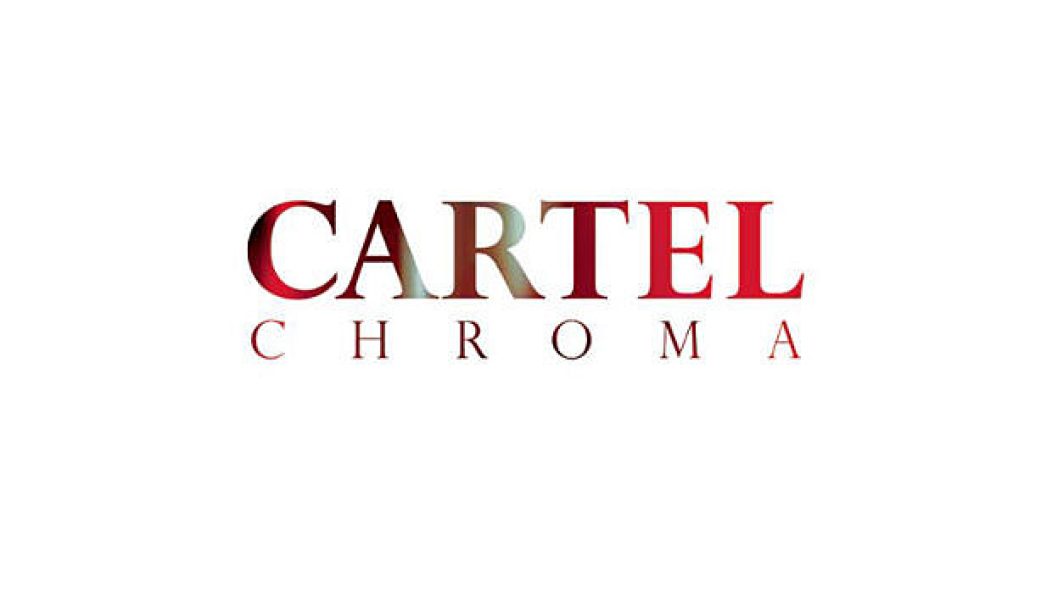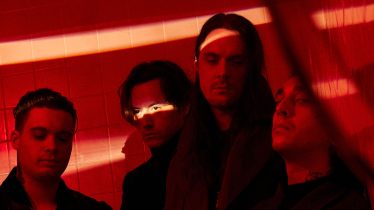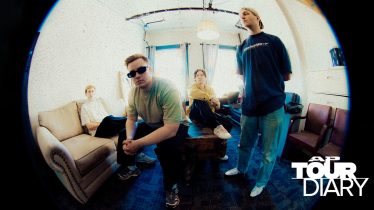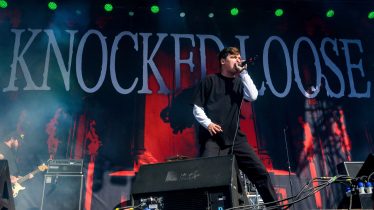
Will Pugh of Cartel looks back on 10 years of 'Chroma,' “Honestly” going Gold
In September 2005, Cartel released Chroma on The Militia Group, a tiny independent record label based in Long Beach, California. The Georgia sons would break into the mainstream on the heels of the success of the record's first single, “Honestly.” The song, a call to arms for lead singer Will Pugh as he was trying to get his girlfriend back, would help land the band a spot on Epic Records' roster.
Ten years later, Cartel celebrated the release of that album by playing it front-to-back on a tour that criss-crossed America and may even head to Australia before the end of the year. Serendipitously, “Honestly,” Cartel's breakthrough moment, also recently achieved gold status after all these years, officially moving 500,000 copies into the hands of listeners. AP caught up with Pugh recently to reflect on what it's like to go Gold, how his band may have been snake bitten through the years, if he feels responsible for inventing the selfie and a very memorable––and very expensive––haircut.
I wanted to start with “Honestly” going Gold. That's pretty amazing. How did you guys find out?
WILL PUGH: We had been told a few times over the last three or four years––we kept up with the numbers and where it was at because obviously it was a popular single. We knew it was in the 400,000s somewhere, and we thought, “Oh, it would be cool.” And while we were discussing this tour and whatnot, it seemed like with the 10-year anniversary, it would be a good time to try and get [a Gold record]. We asked our manager to check in on the SoundScan and sure enough, it was, like, 490,000 or something. This was back in January. He checked in with Epic, and they were like, “Oh, yeah. We're good. We just had to go through the certification process.”
You guys have been out on the road playing Chroma. Are people still excited about the record 10 years later?
It's been kind of crazy. We haven't really headlined a full tour in probably four years or so. We were kind of keeping our expectations low while still trying to do whatever we could. We started out with the first couple days in places where traditionally we had done all right, but not exceedingly well. But it started to balloon from there. It's been a great experience to see people come out and react. I know in L.A. a couple nights ago, there was a 104-decibel limit. There was an SPL meter that reads decibel level, and the crowd, during one of the songs, was actually three decibels louder than the PA. So, it was like, “Okay! All right!” It's been kind of nuts. L.A. is usually a pretty tough show to play because they see everybody. So, it's very hard to get a crowd moving or have any sort of real great reception that you're used to on some of the East Coast shows. But, it was, by far, after two songs, the best L.A. show we've ever had. So, it's been a little surprising in that it's not that we thought the tour wouldn't do well––we thought it'd do all right––but it's surprising. Even the couple nights when we've had smaller crowds, there's a lot of energy in the small crowd for the show, which is not typical. So, it's been awesome.
Playing these shows and being so far removed from the record, have you guys as a band, or maybe you personally, attached a different perspective to some of the songs compared with when you first wrote them?
Yeah, looking back on a few songs, there's definitely some youthful angst and optimism in some of the lyrics, and now, just turning 31, it's like, “Well…” [Laughs.] I was definitely a young sprout when I wrote that. It definitely offers a little different prospective, but it's nice because I feel like it's a good reminder of where we were and why, or of the things that were effecting us––they ultimately determined how the record came out lyrically. We were just getting out on the road and there was this “us vs. them” mentality. And it still is, but when you're 22 [it’s], “Oh, yeah. It's us vs. them. We're going to go get them.” There was a little more of that, but the older you get, there's a little more tempered realism that comes with life. [Laughs.] Lyrical subject matter changes. But it's still cool to go over songs. “Q” and “A” are traditionally songs we don't play live because it's 12 minutes long. Getting to actually sing those lyrics and rehash and revisit it, it's really cool. That's still one that I would write it the same today, if I had to do it over again. It's pretty nice to see the flux in the record, like, “God, I can't believe I wrote this lyric; Okay, here it goes.”
Are you attached to some of those emotions still? Will you always have that angst in you, even as you grow older?
Oh, yeah. My wife calls it a problem. I'm still very much inspired by the same sort of situations. I think a lot of the lyrical content, like “Burn This City” and “Save Us” to a certain extent, kind of led the way into some of our later records from a lyrical standpoint. I feel like that was kind of the beginning of voicing the feelings that I had. Because 19 to 20, around that age, you start to see the world a little bit clearer than you did when you were in high school when your parents were paying the bills. But then you start paying your bills and you have to get a job and move out and you're like, “Man. This place kind of sucks!” So, yeah. It's from a different perspective, having a lot more education and a lot more experience and time to think about everything. I definitely still have a lot of the same passion about it, but just in a little different ways that were expressed on that record. But it's still nice to go, “Yeah. Remember that? Remember when we were filled with piss and vinegar? Go get that again.”
When it comes to “Honestly,” lyrically, can you remember what inspired it?
Yeah. [Laughs.] Basically, it was at this point in time where my wife and I were still dating and we were in college and I left and went out on tour. We had broken up and I was like, “I'm going on tour, and you're going to be in college. I don't know how long I'm going to be gone, pretty much perpetually. So, I think it's best if we break up.” We had been dating for three or four years, but we were broken up for about a year and she had started dating someone else for a little bit. And that made me want to fucking kill things. And this was long––maybe six months after we had broken up. I was like, “Yeah, I'm coming off the road and I'm going to see you for the first time,” and then her dating someone else started happening and it affected me a lot more than I thought. It just ate at me so hard. So, that's basically where “Honestly” came from. Like, “I don't know what I'm going to do or how I'm going to do it, but I'm getting you back.” “If I Fail” was kind of the same thing.
And it worked.
It did work! We've been married for seven years in a couple weeks. I got her!
Do you remember whose idea the video was? The treatment with the couples and the colors? Your first couple videos were so colorful––what was that about?
The guy who did all that––his name is David Ahuja––he works at this company in New York called Athletics, which is like an ad design firm that one of our friends from high school started with a couple other guys. The guy who started it is probably the smartest guy I know in the world. The day they came up with the concept for the video and brought it to us, we were like, “Yeah, that sounds cool.” It's crazy now, looking back on it. We were doing the Buzzfeed thing a couple weeks ago and they were like, “How do you feel that you basically invented the selfie?” I was like, “What?” So, I went back and saw it, and was like, “My God.” I guess that kind of was … that whole Myspace––taking pictures of yourself was kind of the thing and nobody had really ever done a video like that before.
I don't think I'm going to take credit for inventing the selfie because otherwise, I would hang myself, but at the same time, it's pretty cool. Especially seeing people taking pictures with real cameras and Polaroids. Somebody's going to look back on that someday and be like, “Oh, that was the dark ages.” I know I just sounded like an old man with that whole thing, but it's pretty cool how it all came together. We had a casting call, but a couple of our friends from high school were with the guy who came up with the concept and they were in the video. They just kind of came up with it and they shot the whole thing on a green screen and then brought us in to a do the live portion on a separate day. It was a lot of fun. We were nervous as hell, though, because it was our first video. Actually, we had to shoot it again. I don't know if people know that, but there's two different versions of the video and the only thing that changed was our live performance.
Really? I didn't know that.
Yeah. This is a lesson in why major labels needed money. We did the original video for, like, maybe eight to 10 grand or something like that. And since then, the building that we did it in had changed. It was in different ownership––those guys had actually owned part of the building at the time. So, we get signed by Epic––we had done the original video on The Militia Group––but we get signed by Epic, and they're like, “All right. We want to recut this video.” They said they wanted to reshoot it because they didn't like my haircut.
They were like, “You guys look a little different now; we'd like to reshoot.” In the original, we were on tour, living on people's floors and we looked rough. In the original, I was wearing a stripe-y sweater thing and I guess now, it's me wearing a gray long-sleeved T-shirt. But, yeah. They wanted to reshoot the whole thing because they didn't like my haircut. I was like, “All right.” So, they go the people who originally did it, and they were like, “We don't have that building anymore, so we'd have to rent it from them.” Apparently, the place had turned into some sort of high-end production place and they did $10,000 rent-outs for a day. We were like, “Oh my god,” and Epic was like, “Yep. Whatever.” So, they ended up having to spend $20,000 just to reshoot the live portion of the video. We call that story “The $20,000 haircut.” I mean, it did look better. I'll give them that. [Laughs.] But, why?
Did it look $20,000 better, though?
You'd have to get somebody at Epic to answer that.
Wow, that's insane. Along those lines, I always thought those songs that you guys wrote were just perfect pop songs. There was no reason you shouldn't have sold 500 trillion copies of records. So, I've always wondered … why didn't you sell 500 trillion copes of records? Was it because of Epic? Was it because of the major label blowout? What happened?
If I could impart any wisdom on a label owner, it's that I feel like … we came across this with Collider. We made that all on our own. Paid for everything independently. We shopped that around to four or five different labels. The typical names, no majors. They were all like, “Cool! But we're not going to sign it because we didn't have anything to do with it.” I feel like a lot of labels want that ownership. Not in a sort of money sense, but that actual emotional, sentimental ownership of it to feel like, “Yeah, we did this.” Which is kind of stupid, because the artists do it, not the labels.
That's the joke of this whole thing. We have a popular record. “Honestly” got to number 18 or 19 on the Top 40 charts, which is crazy for a band to get there who came a little bit from nowhere. It was crazy for a band to get to that point, especially when pop radio is so hard anyway. And they never worked a second single. They actually never worked “Say Anything (Else)” to radio, which was going to be the second single. They had all these things––we're going to do “Say Anything (Else)” and then we're going to do “Runaway” or “Matter Of Time” or “Save Us.” And then [MTV’s Band in a Bubble] came up and they were like, “Okay. We have to do this.” They had a radio campaign already planned for “Say Anything (Else),” but they were like, “We gotta do this (the bubble).” We had a record that sold 200,000 copies and is currently in the Top 20 on pop radio and you don't want to work another single? They were like, “If we take this momentum now and then dump a new record on top of it, we could probably blow it out.” And I was like, “Yeah, but one single? No. Keep working singles. People still need to hear this. We could ride this record for another year, so let's do another record at the end of the year after you've worked two more singles.” But, the timing wasn't going to work out with the bubble. We weren't forced into the bubble, necessarily, but it was kind of one of those, “Well, this is a really big opportunity that we really think you guys should do and if you don't do it we understand, but … we can't necessarily say we're going to be thrilled about that.” We never had any turmoil with labels on any albums. We were never pissed off or … well, that's not entirely true, but for the most part, we've had a very symbiotic relationship. But they screwed the pooch with that record. Like, how could we not work more than one single? This is insane.
Yeah, but even on the second record, the self-titled record, there were tons of singles on that. What happened with that record? And then a song like “Let's Go” on the next record––that's a great song, too. I mean, again: How have you guys not sold five trillion records?
[Laughs.] Well, on the second album, that was where things went south with Epic. Our A&R was the Vice President for A&R at Epic, so he had a lot of burden on his shoulders and a lot of stuff to prove. So, once we got the record mixed and mastered, I actually had a meeting with Epic and all the various people who mattered there. We listened to the whole record, and we were trying to game plan and get their feel for it. The guy who signed Smashing Pumpkins had just come in to take over the rock side of Epic. Really cool dude, loved talking to him and all that. And he's like, “This is a rock record, guys. We need to work this. We need to do this, this and this.” And they were like, “Nah, we need to do that, that and that.” Not bickering, but disagreement a little bit. Ultimately, it came down to, we're going to do a video for “Lose It” and we're really going to push it and the record's going to be released in September and we'll start impacting radio a month before that. So, a month before that comes, and we're like, “When's our add date at radio?” And [the label] was like, “Yeah, we're actually going to push it a couple weeks” because Green Day was coming out, or something like that. So, they did that, and then it never got worked to radio.
We came out and sold 28,000 the first week or so of that record, and I think it was No. 8 or something. I forget, but it was pretty good. And the weeks went on and still nothing at radio and they still weren't doing anything and they weren't trying to work it. So, I realized, this is ridiculous. We just did a freaking miniseries on MTV and why the hell aren't you taking this to radio? So, we actually ended up hiring our own radio promoter, just to stick it to them a little bit. They were just going to do the east coast radio stations that we really crushed with “Honestly.” We were like, “If you're not going to do it, then we'll pay for it.” And they didn't know that, so when the program directors were getting phone calls from this guy, an independent promoter, they were like, “Wait. Why am I not getting a call from Epic?” Then they'd obviously let Epic know, who was like, “What are you doing?” We'd say, “We're doing your job, is what we're doing. So, when you want to work a single, let us know and we'll stop paying this guy.” They were like, “Well, it's a little more complicated than that.” I was like, “I don't know how you make it more complicated. It's not that hard. You're not sending a rocket into outer space; you're calling people to put a song on the radio. It's not that difficult to start it.”
Then our A&R got fired at the same time. They were like, “Your salary's too much, get out of here.” So, we got a new A&R and we're like, “Now, we're going to do it. We're going to work 'The Fortunate.' 'Wasted' is going to be the next single, we're going to bust out a killer video.” And then, just nothing happened. Which is crazy, because “The Fortunate” ended up being our No. 1 song on iTunes. It's the No. 1 song on Pandora. And we don't get it because that song was never worked in any way shape or form and that song is by far our most popular song.
With Wind-up, they actually were a great label, great people. They really, really worked really hard. “Let's Go,” they tried to work to alternative radio. They tried to work it really hard at alternative and the line had sort of moved pretty good since the early 2000s, when they would play Taking Back Sunday songs on alternative radio. But then it moved way more toward the fringe and what they could get away with. So, they would say, “You're not quite dark enough or edgy enough to pull this off at rock, so we're going to move this over to pop.” And then pop was like, “Well, it's a little too rock ’n’ roll for pop.”
It seems like it's a product of being unlucky more than anything. That's gotta be frustrating.
Yeah, it's very frustrating. There's a couple different industry people who we haven't really worked with, but we're friends. And they were talking about Chroma and they were like, “Everybody in the industry around that time––everybody we talked to about this record basically assumed that however many records you end up selling, multiply that by four or five because of downloading and all that, and that's what you would have sold prior to downloading.” So, we would have had a Platinum record, basically, and that would have been off of one single. They're like, “If you guys would have worked two or three off that, who knows.” So, it's just like, “Son of a bitch!” [Laughs.]
So, it is what it is, and it's part of the reason why going Gold is so fulfilling. Because I believe if Chroma would have gotten full treatment, it could have at least gone Gold. I think right now, we're at 280, 290 thousand copies of that. So, I feel like it could have gotten there, especially with a second single. But, you know, it is what it is. It's like going out to surf and hitting the wave at the wrong time. ALT







